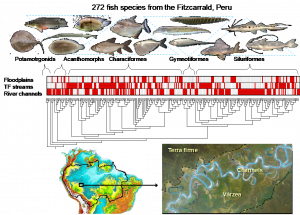Presented By: Ecology and Evolutionary Biology
EEB Museums Friday Seminar: Historical ecology of Neotropical freshwater fishes
James Albert, Professor, Department of Biology, University of Louisiana at Lafayette

This talk will provide a synoptic overview of a new book project now being prepared by the community of Neotropical ichthyologists entitled Historical Ecology of Neotropical Freshwater Fishes. The humid Neotropics is home to the greatest concentration of biodiversity on Earth for many groups of organisms, including continental (or freshwater) fishes. The full dimensions of Neotropical freshwater fish (NFF) diversity have only come to be appreciated in recent years. As of this writing we have described about 6,088 NFF species, in 854 genera, 95 families and 39 orders. From torrential headwaters cascading off the Andean cordilleras and upland cratonic shields, to the murky waters of large lowland river channels, floodplains and swamps, NFFs thrive in astonishing abundance and diversity. NFFs in fact represent the most species-rich – and species-dense – continental fauna on Earth. Recent years have also seen rapid increase in our knowledge of the phylogenetic and ecological dimensions of NFF diversity, and the adoption of many innovative methods to study and understand the historical ecology of this singular fauna. NFF species inhabit a broad range of aquatic habitats, ecoregions and climate zones, displaying a bewildering array of organismal phenotypes that potentially confer functional advantages. Many NFFs possess ecophysiological and behavioral traits and tolerances that promote co-existence in species-rich local assemblages, some of which may also enhance evolutionary diversification. Other specialized phenotypes of sexual communication systems, including sensory cues and courtship displays, inhibit species from hybridizing and therefore promote higher species richness of local assemblages. The goals of this book are to synthesize current information on the historical ecology of NFF taxa, and to document the phylogenetic history of the many distinctive ecophysiological phenotypes of these fishes adapted to diverse habitat, dietary and other life-history specializations.